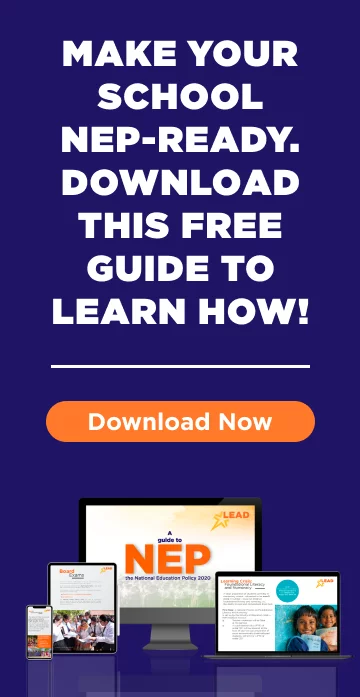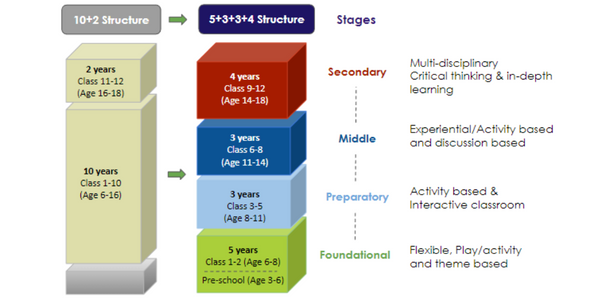NEP 2020: Addressing Learning Crisis and Building Foundational Literacy & Numeracy
According to New Education Policy 2020, learning for exams should not be the end goal of schools. How does LEAD ensure more than just academic growth?

According to New Education Policy 2020, learning for exams should not be the end goal of schools. How does LEAD ensure more than just academic growth?
Last Updated On: 11/11/2022
Siddharth Saxena
School Owner

According to the World Bank, “The COVID-19 pandemic has exacerbated the learning crisis, and the impact on the human capital of this generation of learners is likely to be long-lasting.”
The key thrust of the New Education Policy 2020 is to move the Indian education system towards real-life experiences and help students grasp “how to learn?” — and away from the culture of rote memorisation that is largely present in most schools today.
In this article

Key initiatives in this direction

LEAD delivering more than academic excellence
For this, the New Education Policy 2020 recommends the following key initiatives:
1. The New Pedagogical & Curricular Structure to Make Learning Holistic, Integrated, Enjoyable and Engaging
The New Education Policy 2020 proposes a significant change in how we structure school education. It recommends that schools move from the old 10+2 structure to the new 5+3+3+4 structure to make learning and teaching more age-appropriate. The breakdown of the 5+3+3+4 model is as follows:
- 5 Years of Foundational Stage (Class 1-2 (Age 6-8) + Pre-school (Age 3-6)) – The studies will focus on multi-level, flexible play/activity and theme-based learning to promote children’s overall development and well-being.
- 3 Years of Preparatory Stage (Class 3-5 (Age 8-11)) – The learning will be activity based through interactive classrooms to help develop students’ basic numeracy and literacy skills.
- 3 Years of Middle Stage (Class 6-8 (Age 11-14)) – With an experiential and interdisciplinary pedagogical approach, the learning will be activity and discussion based to develop students’ core academic and life skills.
- 4 Years of Secondary Stage (Class 9-10 + Class 11-12 (Age 14-18)) – With a multi-disciplinary approach, this stage will give students the flexibility to choose from a broad spectrum of subjects to enhance their critical thinking and problem-solving skills.
By replacing the old education structure with the new one, the New Education Policy 2020 expands the age bracket of schooling from 6-14 years to 3-18 years, reducing the number of years spent in each phase while allowing students to spend more time in the school.
2. Early Childhood Care and Education (ECCE) – The Foundation of Lifelong Learning
The New Education Policy 2020 acknowledges that over 85% of a child’s cumulative brain development occurs up to six years of age. Therefore it gives utmost importance to providing universal access to free, safe, and high-quality Early Childhood Care and Education (ECCE) across the country. The new 5+3+3+4 education structure provides a strong foundation for ECCE right from age 3 by encouraging the following types of learning:
- Flexible
- Multi-faceted
- Multi-level
- Play-based
- Activity-based
- Inquiry-based
- Discovery-based
These learning methods comprise:
- Languages
- Colours and shapes
- Alphabets, numbers, and counting
- Puzzles and logical thinking
- Problem-solving
- Craft, drama and puppetry
- Music and movement
- Drawing, painting and other visual art
- Indoor and outdoor play
Additionally, it also focuses on developing:
- Social capacities
- Ethics
- Good behaviour
- Courtesy
- Sensitivity
- Personal and public cleanliness
- Teamwork and cooperation
The New Education Policy 2020 focuses on four key areas to improve the quality and access to Early Childhood Care and Education (ECCE):
- Preparatory Classes for students moving from Pre-primary to Primary (Grade 1)
- Universal Access to ECCE for all children from 3 to 6 years
- New Foundational Learning Curriculum developed by NCERT that integrates Indian traditions for children up to age 8
- Multi-faceted Learning to foster play, activity, and inquiry-based learning
In short, ECCE aims to promote children’s cognitive, physical, motor, cultural/artistic, and socio-emotional-ethical development.
3. Foundational Literacy and Numeracy (FLN) – An Urgent & Necessary Prerequisite to Learning
According to the New Education Policy 2020, over 5 crores of students in elementary school have not attained foundational literacy and numeracy (FLN), which refers to the ability to read and comprehend basic text. To make sure every student achieves FLN by Grade 3 by 2027, the New Education Policy 2020 adds the following three Developmental Goals for K-3:
- Children become effective communicators
- Children maintain good health and well-being
- Children connect with their environment and become evolved learners
The focus group for FLN is 3-9 years old children from preschool to Grade 3. To meet each of these goals, the New Education Policy 2020 recommends that schools cover the following components of foundational literacy in the curriculum:
- Reading Comprehension
- Oral Language Development
- Coding
- Writing
- Vocabulary
- Reading Fluency
- Phonological Awareness
- Pre-Number concepts
- Patterns
- Measurement
- Data Handling
- Mathematical Communication
- Shapes and Spatial Understanding
- Numbers and operations on numbers
To help schools achieve this, NCERT and SCERTs will develop an interim 3-month play-based ‘school preparation module’ for Grade 1 learners, along with making a national repository of high-quality resources on FLN available on DIKSHA (Digital Infrastructure for Knowledge Sharing).
4. Equitable and Inclusive Education – Learning for All
The New Education Policy 2020 aims to provide equitable and quality education to all children up to 18 years, right from the Foundational Stage through Grade 12. It states that no child should lose any opportunity to learn and excel due to learning disabilities or other circumstances. For this, it emphasises:
- Monitoring students’ learning levels and providing them ample opportunities for remediation accordingly.
- Including topics such as sustainability, human values, global citizenship, etc., in the school curriculum to pave the way to a more equitable and inclusive society.
- Paying special attention to students from underprivileged and socio-economically disadvantaged groups.
- Creating a ‘Gender-Inclusion Fund’ to provide equitable and quality education to all girls and transgender students.
By providing high-quality education to all, the New Education Policy 2020 strives to transform India sustainably into a vibrant and equitable knowledge society or, specifically, a Global Knowledge Superpower.
5. Revamping/Reassessing Assessments – Build 21st-century Skills
The New Education Policy 2020 recommends the following initiatives regarding assessments to make them ‘as’, ‘of’ and ‘for’ learning:
- Digital Assessments – Conduction of online summative assessments and examinations.
- Board Exams – Subjective and objective papers
- Holistic Report Card that captures more than academics
- Competency-based Assessments to target competency rather than knowledge
The purpose is to instil future-proof skills among 21st-century learners.
The New Education Policy 2020 encourages all schools to go digital by adopting EdTech solutions. It recommends leveraging the power of modern tools and technologies to make learning accessible to everyone at all levels of education. For an uninterrupted teaching and learning experience, the New Education Policy 2020 recommends the following key initiatives:
- Investment in an open, evolvable, and interoperable public digital infrastructure.
- Extension of existing eLearning platforms.
- Use of ERP software, learning management systems, assessment platforms, etc.
- Creation of virtual labs and digital repositories for practical, hands-on learning experiences.
- Use of digital devices, such as tablets, with preloaded content for online learning.
- Use of student-appropriate tools like apps and games to encourage fun-based learning.
- Conduction of online assessment and examinations.
- Rigorous training to turn teachers into top-notch online content creators.
However, the New Education Policy 2020 clearly states that schools must not ignore face-to-face, in-person learning while promoting digital education and learning.
Never miss a story
Stay updated with the latest news and articles related to school education
GIVE YOUR SCHOOL THE LEAD ADVANTAGE


How LEAD is Delivering More Than Just Academic Excellence to Students
LEAD, India’s largest School EdTech company, understands that students need more than just academic excellence to excel in today’s constantly evolving world. Therefore, it focuses on students’ overall growth and development rather than just academics. It does so through various means. For instance:
- An integrated, theme-based pre-primary curriculum
- Multimodal smart classrooms
- Practice books and grade-wise activity kits
- Multimodal, experiential, activity/theme-based learning
- Strong USE-THINK-BUILD pedagogical approach via CPA, VLC and LBD routines
- More focus on Higher Order Thinking Skills
- Morning Routine, Yoga & PE (Physical Education)
- Early EVS and Early Mathelogic
- Early ELGA and Creative Arts
- Computational Thinking and Coding from Class 1
- Lead Championship for high-performers
- LEAD Summer Camp
- LEAD Masterclass
- Student-led Conferences (SLCs)
- Super 100 for Grade 10 students
- Digital assessments through Practice Tests on student app
- Learn-by-Doing module
- A CPA (Concept-Pictorial-Abstract) approach
- Extracurricular Activities
Conclusion
With over 400+ locations across the country, LEAD is India’s first ‘EdTech Unicorn’ of 2022, powering 3000+ schools to deliver international standard education that is in sync with NEP 2020. So if you want to ensure students’ overall growth and development at your school, get in touch with us today to get a FREE NEP Consultation.
Article Summary
- New Education Policy 2020 emphasises conceptual understanding rather than rote learning and learning for exams
- New pedagogical & curricular structure of 5+3+3+4 will make learning holistic, integrated, enjoyable and engaging
- NEP utmost importance to providing universal access to free, safe, and high-quality Early Childhood Care and Education (ECCE)
- NEP 2020 wants to ensure every student achieves FLN by Grade 3 by 2027
- NEP wants to build future-proof skills among 21st-century learners
- New Education Policy 2020 encourages all schools to go digital by adopting EdTech solutions
- New Education Policy 2020 clearly states that schools must not ignore face-to-face, in-person learning

